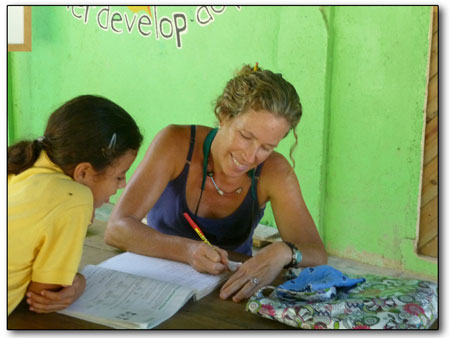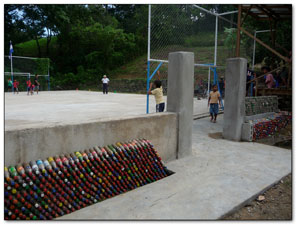 |
|
Kerry Tichi works on an English lesson with one of her students in Roatan, Honduras. Tichi and her husband, Mark, started Care4Communities, a nonporift organization dedicated to furthering the education of and offering sports opportunities for children on the tiny tropical island./Courtesy photo |
A sporting chance
Durango couple spreads hope through Honduran education, sports program
by Page Buono
When Mike and Kerry Tichi moved their family to a small, poverty-stricken Central American island in 2009, their hopes of giving back were abstract at best. However, five years since the Tichis boarded the plane for Roatan, Honduras, those dreams have solidified. And through their nonprofit organization, Care4Communities, they have made real – and what they hope will be lasting – changes in their adopted home.
For Mike, the philosophy of the humanitarian effort was simple: “We should be using our gifts, talents and resources for something other than ourselves,” he said.
Both missionaries, the Tichis had partaken in more “traditional” Christian missionary trips in the past. However, they weren’t necessarily sold on that approach, which often had an emphasis on handing out funds or supplies. “When we go to help and we just hand things out, what does that teach?” Mike said.
The Tichis decided they didn’t want a one-week project. They wanted to build a lasting relationship. And, they wanted the community to take the reins: defining its needs, using its skills and training its own leaders.
After traveling around for nearly two years, the couple decided that Roatan was a place they could see themselves moving to with their three small children: Luke, Lilly and Levi, who were 7, 6 and 5 at the time. They also saw it as a place where their respective skill sets – hers as a teacher and language pathologist and his as a sports coach and construction worker – could be utilized.
Roatan is a place with a unique and complex history. The largest of Honduras’ Bay Islands, it is only 38 miles long and approximately 5 miles wide, with limited resources and fresh-water access. It is largely Spanish-speaking and was historically populated by descendants of African slaves, or “Islanders,” who were brought to the island to work in the mines.
However, over the last several decades, the population of the island has changed, from around 15,000 in the ’70s to an estimated 75,000-90,000. This is partly due to the influx of tourism to the island, which has created a myth of job opportunities. The influx has created fierce competition for not only jobs – Honduras is the second-poorest country in Central America – but resources, resulting in palpable tension between the “Islanders” and the Honduran mainlanders, who come there seeking work.
With support from various churches, friends, family and community organizations like the Durango Youth Soccer Association, which donated used soccer equipment, the Tichis packed up their children and moved to the island in 2009 with a commitment to stay for at least three years. They moved into a small house in a local village of 4,500 in a town called Sandy Bay, amongst the people they hoped to work with.
Kerry immediately put her skills to use teaching English in local classrooms, an activity that allowed her to cultivate relationships with students and their families. Mike, meanwhile, relied on his love of sports to start a sports team.
After a year and a half, it became clear that the island was without any sort of community center, and the two set about helping to establish just such a place.
“Coming from Durango, you can’t help but be passionate about community,” Mike said. “And going to a place that doesn’t have that, you want it for people.”
The Tichis renovated an old building with some of the contributions they received, and local residents volunteered their time and energy to make the project happen – something the Tichis believe was necessary for the success of the project.
“I met with a bunch of other missionaries while I was there and for a year and a half, this one buddy of mine would always say, ‘What’s your vision, what’s your mission statement?’ And I would just sit there thinking, ‘we’re not there yet.’ It made me feel like a big old zero but when it came together it was because we had been putting time into the community and initiating projects, doing different things.”
The final result is a community center, lovingly christened “Casa Mazapan,” after the breadfruit tree towering overhead. There, Kerry teaches English and Mike developed a sports program. The couple also launched a sponsorship program to expand education for local children, who typically only go to school until fourth grade.
Sponsorships begin at $25 a month, which funds transportation for students to and from class. From there, additional funds can support students who continue on to attend private schools and university. More importantly, said Kerry, the sponsorships let students know someone is rooting for them.
“You can give education and you can give money for all sorts of stuff but if they don’t have that hope that someone believes in them, it’s kind of useless,” Kerry said.
While Kerry was teaching both adults and students, Mike started a baseball team with gear he’d brought from the states.
“It gave me credibility down there talking about and teaching the sport I know,” Mike said.
The more the team played, and the more he watched the kids play other sports, it became clear they needed a proper playing surface.
 |
| The sports court at Casa Mazapan. Local kids who filled plastic bottles, foreground, with sand to fortify a retaining wall were enticed with a gift of Durango soccer jerseys./Courtesy photo |
The same man who allowed the Tichis to renovate and rent the building for the center offered up a piece of land to rent for the sports court as well. In an attempt to re-use resources on the tiny island, Mike proposed building the walls of the court (necessary to separate it from a busy road) with used plastic bottles. He explained his idea to local kids and asked for their help in collecting the bottles and filling them with sand for the wall. The incentive of a new play area created tremendous momentum at first but after a while – this was no small project – enthusiasm waned.
Mike was at a loss but remembered the hundreds of donated DYSA jerseys he’d carted down with him. Up until this point, nearly two years into the project, he hadn’t found the right use. In the face of waning interest, he saw a new way to incentivize the kids. Mike put out a sign asking for help collecting and filling bottles and offered a jersey to those who participated. The idea worked, and the project made its way to the finish line.
The Tichi family’s time on the island was not easy, and while they were happy to return in August 2012, they remain committed to the Roatan community. In addition to making three or four return trips a year, Mike and Kerry befriended and trained another couple, Ron and Jamie McDonald, from Arizona, who are the onsite directors of the program, alongside local staff.
Volunteers, both those who come with Mike or Kerry or contact them while they are on the island, are another critical piece of the organization. One such volunteer, Aaron Kloer, 21, a Fort Lewis College soccer player, travelled to Honduras in June of this year. Kloer heard about Care4Communities during a talk Mike gave to his soccer team. While the religious component didn’t resonate with him, the opportunity to play sports with kids in need definitely did.
Kloer said most days were spent playing soccer with the kids, building connections and friendships he maintains to this day. Most of all, he was impressed by the outlook of the people he met, people with relatively little compared to his peers in Durango.
“They just made the best of their situation,” Kloer said. “They’re just excited to be alive, just like we are.”
Mike, along with Kloer, will speak to the FLC team again this year with the hopes of inspiring more people to take a trip to Roatan. That being said, Kloer feels like it is a trip that people should only take if they’re willing and inspired to do so, citing a direct correlation between desire and the quality of his experience.
Some of the program successes so far include 19 sponsored students who, as a result of the support, will continue on to college; five students recently added to the scholarship program; and the development of the sports court, which hosts more than 100 children each day.
For more information or to donate, go to contact Mike or Kerry Tichi at hola@c4croatan.org or www.care4communities.org.
There is currently no content available.
